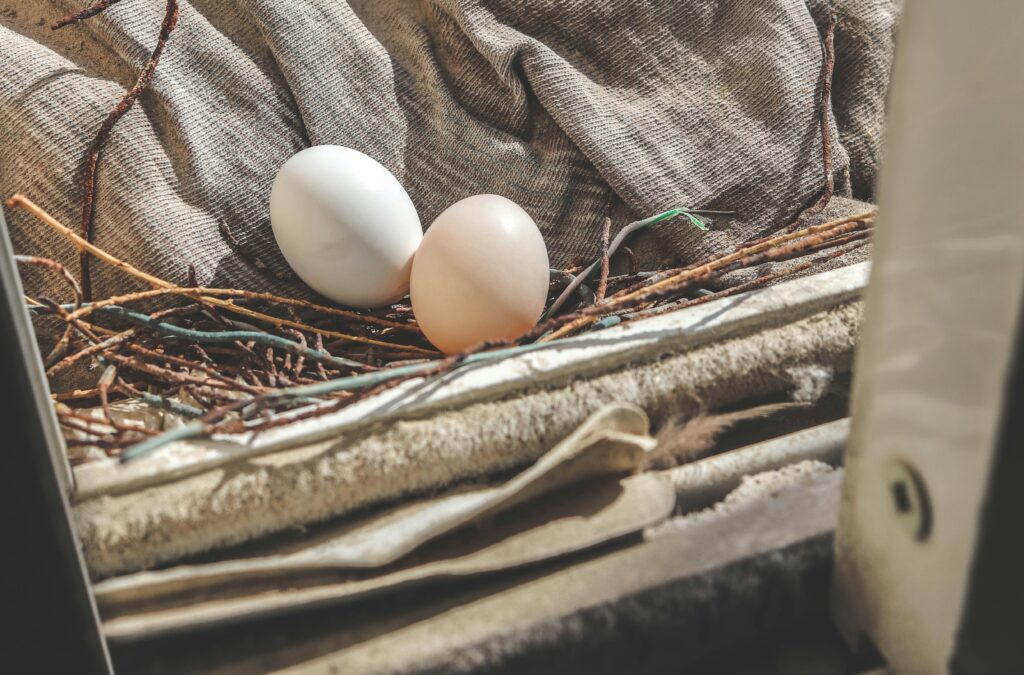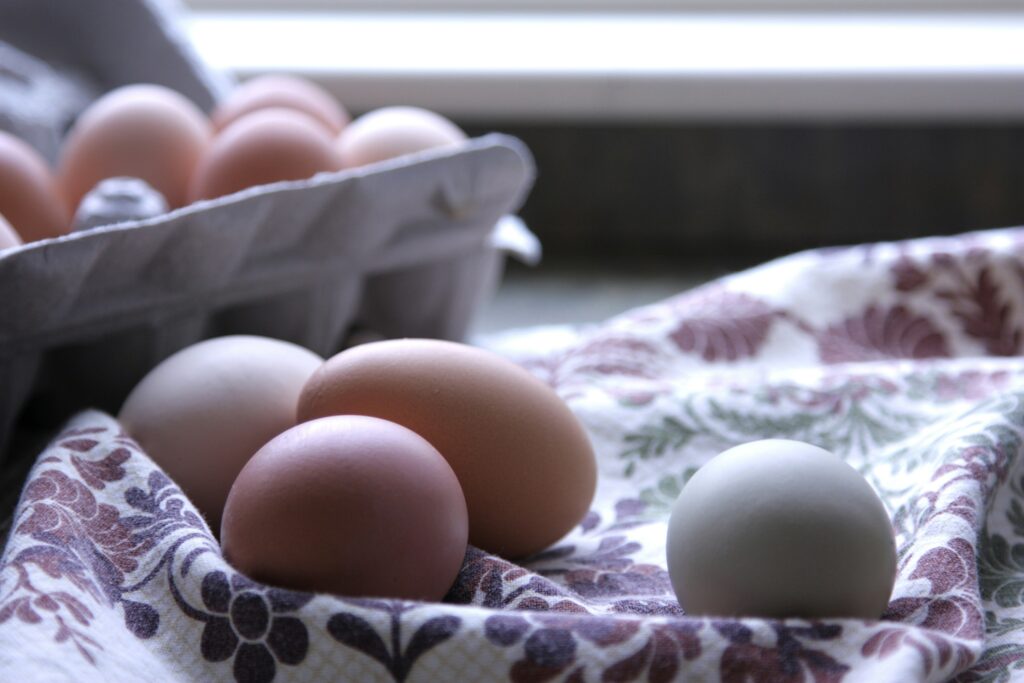Introduction: Understanding Fresh, Unwashed Eggs
Fresh, unwashed eggs—especially those straight from the backyard coop or a local farm—are a different story compared to the typical grocery store carton. Why? It all comes down to the natural protective layer known as the “bloom” or cuticle, which coats the eggshell during laying.
This invisible coating helps shield the egg from bacteria, moisture loss, and contaminants. Unlike washed eggs, unwashed ones retain this protection, which gives them longer shelf life outside of refrigeration—if stored properly.

Photo by Peter Werkman on Unsplash
Why Are Some Eggs Unwashed?
In many countries (like the UK and much of the EU), it’s standard practice not to wash eggs. The idea is to preserve the egg’s natural defenses. Washing can strip away the bloom, leaving the egg more vulnerable to bacterial infiltration and moisture loss.
In contrast, the U.S. mandates egg washing for commercial sale, resulting in eggs that require refrigeration to stay safe.
So when it comes to farm-fresh or backyard eggs, leaving them unwashed keeps their natural defenses intact.
Egg Bloom: Nature’s Protective Coating
The bloom is the unsung hero of egg freshness. Here’s what it does:
- Seals the shell’s pores, preventing bacteria like salmonella from entering.
- Preserves moisture, extending the egg’s internal quality.
- Acts as a natural expiration delay, especially in cool, dry environments.
If you’re planning to store your eggs unrefrigerated, don’t wash them until you’re ready to use them.
Room Temperature Storage Explained
Here’s where the regional debate kicks in. In parts of Europe, Asia, and South America, it’s perfectly normal to store unwashed eggs at room temperature. But in the U.S., many experts recommend refrigeration due to food safety regulations.
Let’s break it down:
- Room temperature (below 75°F / 24°C): Unwashed eggs can safely sit out for 2 to 3 weeks.
- Warmer climates: Limit storage to 1 week without refrigeration, or use passive cooling methods (e.g., cellar storage).
USDA vs. European Standards
| Region | Washing Required | Refrigeration Required | Avg. Shelf Life (Room Temp) |
| USA | Yes | Yes | Not recommended |
| UK | No | No (optional) | 2–3 weeks |
| EU | No | No | 2–3 weeks |
| PH/India | No | No (optional) | 1–2 weeks |
The difference lies in food policy. The U.S. prioritizes preventing salmonella after laying, while other countries emphasize hen vaccination before laying.

Photo by Asim Z Kodappana on Unsplash
How Long Can Fresh, Unwashed Eggs Sit Out?
If kept in a cool, dry place away from sunlight, fresh, unwashed eggs can sit out safely for up to 21 days (3 weeks). However, this is assuming:
- The eggs were laid recently (within the last few days).
- There’s no temperature spike in your storage area.
- The eggs are collected promptly after laying.
Factors That Affect Room Temperature Shelf Life
- Ambient Temperature – Warmer temps shorten shelf life.
- Humidity – Excess humidity can lead to mold or bacterial growth.
- Time Since Laid – Fresher eggs last longer unrefrigerated.
- Storage Method – Keep eggs in cartons or clean baskets.
- Handling – Avoid unnecessary touching or wiping.
Signs Your Eggs Have Gone Bad
- Smell: A sulfur or rotten odor = immediate toss.
- Float test: If the egg floats in water, it’s likely bad.
- Visual check: Cracks, mold, or unusual discoloration are red flags.
- Sound: Shake it—if it sloshes, it’s gone bad.
Safe Storage Recommendations
Storing Eggs Without Refrigeration
- Use a cool, dry pantry (ideally under 70°F).
- Store with the pointy end down to keep the yolk centered.
- Rotate eggs (FIFO: first in, first out) to use older ones first.
How to Store Eggs in the Fridge (If Needed)
If refrigeration becomes necessary:
- Keep them in the main body of the fridge, not the door.
- Store in original carton to prevent moisture loss.
- Label with date laid to track freshness.
Should You Wash Fresh Eggs Before Storage?
No—not if you plan to store them unrefrigerated. Washing removes the bloom and makes eggs porous. If you must wash:
- Use warm water, not cold.
- Don’t use soap or detergents.
- Refrigerate immediately afterward.
Risks of Leaving Eggs Out Too Long
If left in warm or unsanitary conditions:
- Bacteria can penetrate the shell.
- The yolk can weaken or collapse.
- Spoilage accelerates, especially in humid environments.
When in doubt, do the float test or crack the egg into a separate bowl before using.
Comparing Washed vs. Unwashed Eggs
| Factor | Washed Eggs | Unwashed Eggs |
| Bloom | Removed | Intact |
| Refrigeration | Required | Optional (if stored properly) |
| Shelf Life (Fridge) | 4–5 weeks | 3–4 weeks |
| Shelf Life (Room Temp) | Not safe | Up to 3 weeks |
Best Practices for Backyard Egg Collectors
- Collect eggs daily to minimize contamination.
- Store in egg trays or baskets in a shaded area.
- Mark eggs with dates using a pencil for tracking.
- Use older eggs first (they’re best for boiling).
- Leave the bloom intact for max shelf life.

Temperature Considerations by Region
- Tropical zones: Refrigeration may still be preferred after 5–7 days.
- Cool climates: Eggs can last weeks on countertops or pantries.
- Use clay pots or coolers for passive cooling if needed.
What Countries Leave Eggs Unrefrigerated—and Why
Many countries safely store unwashed eggs outside the fridge:
- UK, France, Spain: Ban commercial egg washing.
- Japan: Wash eggs but rely on cold chain for safety.
- Australia/New Zealand: Mixed practices based on farm protocols.
They rely on vaccinated flocks, tight hygiene, and public education.
Common Myths About Egg Storage
- Myth: All eggs must be refrigerated.
Only if washed! - Myth: Brown eggs last longer.
Shell color doesn’t affect shelf life. - Myth: Room-temp eggs are unsafe.
Not true for fresh, unwashed ones stored correctly.
Preserving Eggs for Long-Term Storage
Want your eggs to last months? Consider:
- Water glassing (lime solution)
- Oil coating (mineral or coconut oil)
- Freeze-drying or powdering
- Freezing (after cracking and mixing yolk + white)
Each method has pros and cons—choose based on your use case.
FAQs
Can you eat eggs that have been left out overnight?
Yes, if they’re fresh, unwashed, and kept in a cool place—use within 2–3 weeks.
Is it safe to store eggs at room temperature in summer?
Only if the indoor temperature remains below 75°F. Otherwise, refrigerate after a few days.
How do I know if an egg is still good?
Try the float test: fresh eggs sink, old eggs float.
What’s the best way to store unwashed eggs?
In a cool, dry place, away from sunlight. No need for a fridge unless temps spike.
Do eggs go bad faster if you wash them?
Yes. Washing removes the protective bloom, speeding up spoilage unless refrigerated.
Can I leave washed eggs out if I oil them?
Oiling offers some protection, but it’s safer to refrigerate washed eggs.

Conclusion
Knowing how long fresh, unwashed eggs can sit out is essential for food safety and homesteading success. By understanding the role of the bloom, regional best practices, and safe handling techniques, you can confidently store and use eggs without refrigeration for up to 3 weeks in the right conditions.
